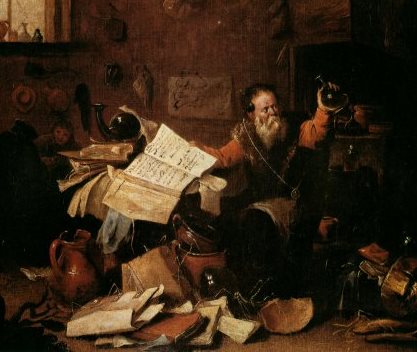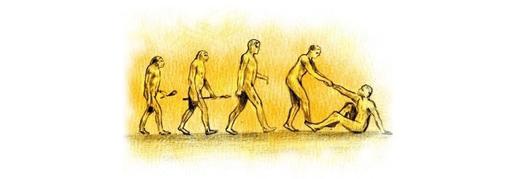The views expressed in our content reflect individual perspectives and do not represent the authoritative views of the Baha'i Faith.
Part II – Cooperation, Morality and Evolution
More actual letters from children to God:
Dear God, It rained for our whole vacation and is my father mad! He said some things about you that people are not supposed to say, but I hope you will not hurt him anyway. Your friend (but I am not going to tell you who I am)
Dear God, Who draws the lines around the countries? – Tyler
Dear God, Maybe Cain and Abel would not kill each other so much if they had their own rooms. It works with my brother. – Larry
Dear God, I bet it is very hard for you to love all the people in the world. There are only four people in our family and I can never do it. – Nan

One of the most singular and striking characteristics of human society, despite our differences, is that strangers regularly help each other. This phenomenon doesn’t commonly and consistently occur in any other species. Studies of infants show that even babies have naturally altruistic behaviors. Altruism – the instinctual desire to help others without any immediate benefit to ourselves – is one of the core attributes that define us as spiritual human beings.
The Baha’i teachings point out that the modern world itself would not be possible without altruism and the spirit of cooperation and reciprocity it breeds. It wasn’t always this way. Early humans and their tribal societies sometimes distrusted people from other tribes, locations and cultures; and fear, friction and warfare resulted. Archaeological studies show that as many as thirty percent of people in early tribal cultures died violently. But as the world began to mature, progressing from its early tribal groups to the institution of the city-state to larger kingdoms and then a system of nations, we gradually realized – through the influence of evolving, progressively-revealed religious teachings and our own collective experience — that cooperative behavior tends to be constructive and helpful to all, and that conflict and violence are destructive and hurtful to all.
Now, through the use of that learned, altruistic cooperation between individuals and groups and even nations, we have succeeded in building incredibly sophisticated societies, elaborate and complex cultures, mutually beneficial treaties, agreements and global enterprises designed to benefit the entirety of the human race. We still have many problems to solve, but as a result of the cooperative behavior we’ve learned so far, we can do things that no individual or limited group can do.
“For example, rectitude of conduct, trustworthiness, and honesty are the foundation for stability and progress; altruism should guide all human endeavor, such that sincerity and respect for the rights of others become an integral part of every individual’s actions; service to humanity is the true source of happiness, honor and meaning in life.” (Statement from the Baha’i International Community, 1995)
We know that a relatively small number of people who selflessly cooperate can achieve much more than a large uncooperative group. Small groups of people helping others at the local level, studies show, are one of the most effective means of social change. Maybe that’s because selfless cooperation happens best in an atmosphere of trust. We naturally trust others when they don’t try to cheat, lie or steal – when their moral outlook allows them to think of others before themselves. That trust and the inner morality that gives rise to it both build the foundations of human cooperation and progress.
So if you think of yourself as spiritual, but not religious, that probably means you try to live a moral life by caring about, helping and respecting others, by being ’other-directed’, as the psychologist Abraham Maslow put it. The roots of that other-directedness, ironically, come straight from a long tradition of teachings common to all religions. Also, without the arc of centuries and epochs to give us perspective about the outcome of good works, and without faith that even when tragedies follow our best efforts, history will lean toward ultimate progress over time, it can seem more challenging for altruists to sustain hope and perseverance.
Viewed through the scientific lens of evolution, it has always been our shared human belief in a Supreme Being that set us on the long path toward modern life by introducing a set of moral teachings designed to promote spiritual, altruistic behavior. That behavior, and the trust it engendered, ultimately gave rise to the group cooperation necessary for peoples and cultures to progress.
In fact, Baha’is believe that all things progress, change and evolve, from each individual soul to our species itself. Even religion, the Baha’i teachings affirm, must evolve or die:

Alchemist from the Middle Ages
When we read ancient history, the history of the middle ages and the history of contemporaneous times, we realize how little the world of yesterday resembles the world of today. The scientific beliefs of the middle ages are disproved and of that which was credited by the ancients, few traces remain. In the same way laws outside of science have evolved and arts and even morals have changes. We can no longer live according to the laws and customs of former times.
Everything is transformed… As everything evolves, so also does religion – as witness the doctrines that are losing their influence today. All religious rites and ceremonies, when adhered to, become the cause of destruction and struggle.
This is the day when dogmas must be sacrificed in our search for truth. We must leave behind all save what is necessary for the needs of today, nor attach ourselves to any form or ritual which is in opposition to moral evolution. (Abdu’l-Baha, Divine Philosophy)
In Part III of this essay, we’ll look at how morality and spirituality have evolved, and at what that evolution has produced.

















Comments
Sign in or create an account
Continue with Facebookor